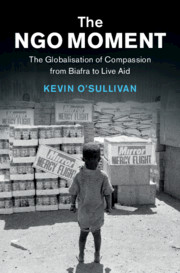Refine search
Actions for selected content:
10 results
1 - Encountering the Third World
- from Part I - The Ends of Empire
-
- Book:
- The NGO Moment
- Published online:
- 01 October 2021
- Print publication:
- 14 October 2021, pp 17-33
-
- Chapter
- Export citation
Conclusion
- from Part IV - A People’s Compassion
-
- Book:
- The NGO Moment
- Published online:
- 01 October 2021
- Print publication:
- 14 October 2021, pp 175-185
-
- Chapter
- Export citation
2 - Putting Down Roots
- from Part I - The Ends of Empire
-
- Book:
- The NGO Moment
- Published online:
- 01 October 2021
- Print publication:
- 14 October 2021, pp 34-54
-
- Chapter
- Export citation
Conclusion
- from Part IV: - A People’s Compassion
-
- Book:
- The NGO Moment
- Published online:
- 01 October 2021
- Print publication:
- 14 October 2021, pp 175-185
-
- Chapter
- Export citation
Introduction
-
- Book:
- The NGO Moment
- Published online:
- 01 October 2021
- Print publication:
- 14 October 2021, pp 1-14
-
- Chapter
- Export citation
1 - Encountering the Third World
- from Part I: - The Ends of Empire
-
- Book:
- The NGO Moment
- Published online:
- 01 October 2021
- Print publication:
- 14 October 2021, pp 17-33
-
- Chapter
- Export citation
Introduction
-
- Book:
- The NGO Moment
- Published online:
- 01 October 2021
- Print publication:
- 14 October 2021, pp 1-14
-
- Chapter
- Export citation
2 - Putting Down Roots
- from Part I: - The Ends of Empire
-
- Book:
- The NGO Moment
- Published online:
- 01 October 2021
- Print publication:
- 14 October 2021, pp 34-54
-
- Chapter
- Export citation

The NGO Moment
- The Globalisation of Compassion from Biafra to Live Aid
-
- Published online:
- 01 October 2021
- Print publication:
- 14 October 2021
4 - The Salvation Agenda
-
- Book:
- The Political Life of an Epidemic
- Published online:
- 10 January 2020
- Print publication:
- 30 January 2020, pp 123-154
-
- Chapter
- Export citation
